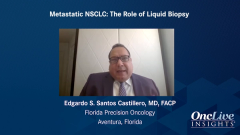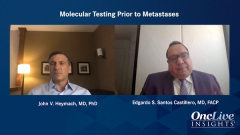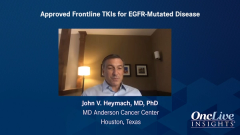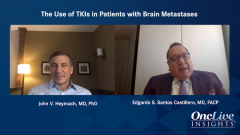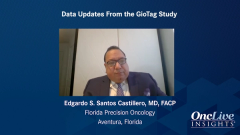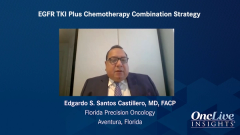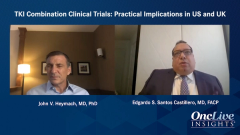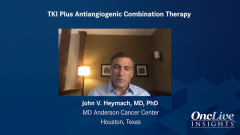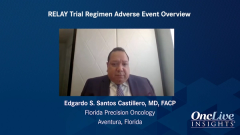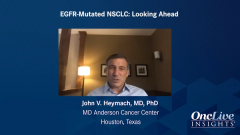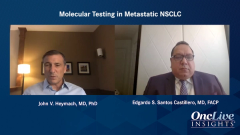
EGFR TKI Plus Chemotherapy Combination Strategy
Episodes in this series

John V. Heymach, MD, PhD: Eddie, let’s move on to talk about ways that EGFR inhibitors can be combined. As you noted before with the IPASS study, and we’ve had a number of other studies since then like AURA3, the TKI [tyrosine kinase inhibitor] is better than chemotherapy, but there is, of course, a question: Are there benefits to putting the 2 together and giving a combination of chemotherapy plus a tyrosine kinase inhibitor? Talk about your experience with that and studies that you think might be relevant to this.
Edgardo S. Santos Castillero, MD, FACP: John, there are 2 studies recently presented in our International Lung Cancer congress. I will go through them, in which TKIs were combined with chemotherapy. We need to understand that, in the past, we tried this approach, but it was an unselected population. It was everyone, and we couldn’t see any difference by combining TKIs with chemotherapy in those trials developed 10 years ago. With that, as you mentioned, we learned more about EGFR, we learned more about the mechanism of resistance, and we started to do exactly what you beautifully described: the sequence of first-generation, second-generation, and third-generation TKIs, and that toxicity has been lowered while efficacy has been moving up. Besides that, when we see those trials, I remember the trial and those in which we used chemotherapy plus TKI. There was another time when we used a combination of erlotinib with gefitinib. There was no difference.
In chemotherapy, we have also made a lot of progress. For the patient with EGFR, they go with a histology in lung cancer that we call adenocarcinoma. For adenocarcinoma, we have this chemotherapy called pemetrexed. The pemetrexed is, in my opinion, also a great development in oncology, specifically for thoracic oncology. If we give the appropriate prophylaxis with folic acid and B12, those 2 vitamins basically shut down the hematologic toxicity from this chemotherapy agent. We have also made advances in that regard.
There are 2 studies in which patients who were EGFR-mutation sensitive were randomized between gefitinib in combination with chemotherapy vs gefitinib alone. The idea is this: By adding chemotherapy to gefitinib, the efficacy will be superior because we know that at this moment, everyone is focused on monotherapy—monotherapy TKI, gefitinib alone, erlotinib alone, afatinib alone, or osimertinib alone. Can we do better? Can we improve upon what we have already obtained with those monotherapy TKIs?
There are 2 studies, as I mentioned before, and those studies have a bit of a difference between them. One was from Dr Yukio Hosomi from the North East Japan Study Group, the NEJ009, and the other is a study from a single institution in India by Dr Vanita Noronha. In those 2 studies, the primary end point was progression-free survival as with all the studies with TKI as well as overall survival. In those 2 studies, which were published this year, the progression-free survival was doubled for the combination of chemotherapy plus gefitinib vs gefitinib alone. The overall survival, which has now become the standard of care for us in lung cancer management as a first-line end point, was also positive in both studies.
Now the question became this: Will we need to do other clinical trials to evaluate that? In this particular study from North East Japan combining gefitinib, carboplatin, and pemetrexed vs gefitinib alone, they have an overall survival, John, of 50 months, which is the highest overall survival that we have seen. The question is this: How will that combination behave against osimertinib, for example? Perhaps osimertinib in combination with chemotherapy in the future can give us better responses. We don’t know. Both of these, which we will talk about later, are coming, but we need to wait for that.
We need to understand the concept of combining or adding chemotherapy to gefitinib in this case. It may make sense because what happens is this: As I mentioned before, the tumor is heterogeneous. You have a lot of subclonal population because not everyone has the EGFR exon 19 and not all the cells have the L858R; they are the subclonal population. We are targeting those, but what about the others that are either less tolerant to the drug or those who will not respond to gefitinib? By making that pressure with those targeted agents like gefitinib, dacomitinib, and all those TKIs, we help those other clonal populations take over. That is where the problems come, as you mentioned before: all those mechanisms of resistance. Then what is there to do? By adding chemotherapy, we are covering that base, and it needs to be like that.
Transcript edited for clarity.


